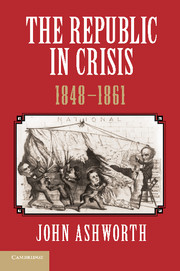Book contents
- Frontmatter
- Contents
- List of Maps and Cartoons
- Chronology of Events
- Introduction
- 1 The United States in 1848
- 2 Crisis at Mid-century, 1848–1851
- 3 Immigrants, Alcoholics and Their Enemies
- 4 Preparing for Disaster
- 5 Political Maelstrom, 1854–1856
- 6 North and South, Republican and Democrat
- 7 Political Polarisation, 1857–1860
- 8 Secession and the Outbreak of War, 1860–1861
- 9 Conclusion
- INDEX
- References
7 - Political Polarisation, 1857–1860
Published online by Cambridge University Press: 05 September 2012
- Frontmatter
- Contents
- List of Maps and Cartoons
- Chronology of Events
- Introduction
- 1 The United States in 1848
- 2 Crisis at Mid-century, 1848–1851
- 3 Immigrants, Alcoholics and Their Enemies
- 4 Preparing for Disaster
- 5 Political Maelstrom, 1854–1856
- 6 North and South, Republican and Democrat
- 7 Political Polarisation, 1857–1860
- 8 Secession and the Outbreak of War, 1860–1861
- 9 Conclusion
- INDEX
- References
Summary
On 4 March 1857 James Buchanan was inaugurated as President of the United States. In his address the new president expressed his hope and belief that the agitation of the slavery question would soon be at an end. The electorate, he argued, had delivered a resounding verdict in approval of the Democratic policy towards the territories. Congress could not and should not intervene; the matter should be left up to the inhabitants of the territory itself. Buchanan recognised that there was some difference of opinion as to the point at which this decision should be made. He himself, he announced, believed that it should be at the time of entry into the Union, rather than at the time the territorial legislature came into existence. But he also declared that the matter was of little practical consequence and that the Supreme Court would soon offer a ruling on the matter. To this decision not only he but “all good citizens”, the President was convinced, would “cheerfully submit”.
Buchanan’s words combined truth with error. The Supreme Court would two days later indeed pronounce upon this, and other questions in its famous, or perhaps one should say notorious, Dred Scott decision. But Buchanan’s hope that this would quell the slavery agitation was unfounded. Instead of the Supreme Court discrediting the cause of antislavery, in the North at least the antislavery cause would discredit the Supreme Court. And “good citizens” in the North, even within Buchanan’s own party, would seek ways of circumventing the Court’s conclusions. During the new president’s term of office, the slavery agitation would become still more intense, and four years later it would plunge the nation into the deepest crisis it has ever encountered.
- Type
- Chapter
- Information
- The Republic in Crisis, 1848–1861 , pp. 148 - 172Publisher: Cambridge University PressPrint publication year: 2012



